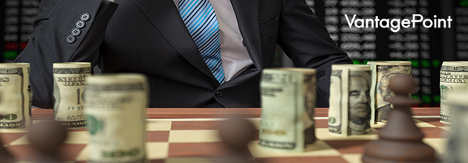 | Read in Browser |
 |
 |
| | Top News  Shutterstock Fifteen years after he co-founded the company, Jack Dorsey resigned as CEO of Twitter (TWTR) on Monday, saying he wanted the company to move on from its founders. Shares rose as much as 12% on the news in premarket trading, but closed the session off nearly 3% as investors digested the developments. "This one really has to shake out... it has got lower lows," said Dan Nathan of Risk Reversal Advisors. "We've seen fleets, Super Follows and Twitter Blue, but if technology and innovation at the company have been the big problem, this kind of news is not going to get the company going."
Bigger picture: Sources say that the succession was planned for more than a year, but it could still be challenging to get the company to repivot to areas like media or social e-commerce. Last year, activist hedge fund Elliott Management took a 4% stake in Twitter and tried to get rid of Dorsey. There were concerns that he was distracted, since he was also the CEO of mobile payments company Square (SQ), as well as other big interests, like in cryptocurrency, which were taking him away from his job.
Twitter chose to go with a company insider as Dorsey's replacement. Chief technology officer Parag Agrawal, who has been at the microblogging service for a decade, will take up the reins immediately. Some of his accomplishments include advancing the state of artificial intelligence and machine learning across Twitter, like projects to make the tweets in a person's timeline more relevant or identifying tweets that violate Twitter's terms of service. Going forward, he has some ambitious goals to fill, such as reaching 315M monetizable daily active users by the end of 2023 and to double annual revenue by that date.
What's next for Dorsey? A crypto future may be in the works and he's still CEO of Square. At the Bitcoin 2021 Conference in June, Dorsey said that "if I were not at Square or Twitter, I would be working on Bitcoin." In terms of Square's business, Bitcoin (BTC-USD) generated $1.82B of its $3.84B in net revenue in Q3, making crypto responsible for nearly half of the company's total sales. | | M&A It's getting harder for Big Tech to expand these days as global watchdogs continue to put the industry in its crosshairs. The latest deal disruption just hit Facebook parent Meta (NASDAQ: FB), which was told by the U.K. Competition and Markets Authority that it must sell GIPHY, the largest provider of animated images to social networks. While it is far from the largest deal Meta has ever done (Facebook scooped up the GIF-sharing platform back for a reported price of $400M), it could be a red flag for tech acquisitions in the current regulatory climate. The concern: The CMA concluded that Meta's acquisition of GIPHY would reduce competition between social media companies like Snapchat (NYSE: SNAP) and TikTok ( BDNCE), or deny or limit other platforms' access to GIFs from GIPHY. In turn, that could send more traffic to Meta-owned properties - Facebook, Instagram and WhatsApp - which account for 73% of user time spent on social media in the U.K. The British regulator also argued that the merger would remove Giphy as a potential competitor to Meta in the display advertising industry. A month after the transaction was announced in May 2020, antitrust authorities in the U.K. and Australia said they were scrutinizing the deal. The CMA's initial enforcement order stopped Facebook from integrating with GIPHY while it conducted the probe, but it issued a provisional finding in August 2021 saying the merger would harm competition, and that the only effective remedy would be for Meta to sell GIPHY. In October, the CMA ended up fining Facebook £50.5M for failing to provide regular updates to show that it is complying with an order .
Response from Meta: "Both consumers and GIPHY are better off with the support of our infrastructure, talent, and resources," said a spokesperson. "We are reviewing the decision and considering all options, including appeal." | | Sponsored By VantagePoint  If you're going to invest countless hours and thousands of dollars trading the markets, you'll need it to pay off. Which is why we're here - to stop you from making expensive and time-consuming mistakes. This week, VanatagePoint is hosting a 1 hour, 100% free online class on the basics of the predictive analysis strategy. There's no cost to register and lots to learn. We've even had some attendees say our free online class is better than some paid courses they've bought. Our experts will be demonstrating how to execute the predictive analysis strategy by using one simple tool. See you in the online room! | | On The Move Following a brief rebound on Monday, Dow futures fell over 500 points overnight, while contracts linked to the S&P 500 and Nasdaq slipped 1.1% and 0.5%, respectively. WTI crude oil ( CO1:COM) is also off 3.6% to $67.42/bbl, while the 10-year Treasury yield fell 10 bps to 1.44%. The downward trend followed a warning from Fed Chair Jerome Powell, which wrote in prepared testimony to Congress that Omicron and COVID, in general, could threaten the economy's post-pandemic recovery. Moderna's (NASDAQ: MRNA) CEO is also predicting that existing vaccines will struggle with the new variant, sending fresh shockwaves through the markets. Quote: "There is no world, I think, where [the effectiveness] is the same level... we had with [the] Delta [variant]," Stéphane Bancel told the Financial Times. "I think it's going to be a material drop. I just don't know how much because we need to wait for the data. But all the scientists I've talked to... are like, 'This is not going to be good.'" The statement raises some eyebrows, as it comes less than 24 hours after the CDC strengthened its existing COVID-19 booster recommendations, saying, "the recent emergence of Omicron further emphasizes the importance of vaccination." President Biden also directed federal agencies to be ready to move quickly to approve additional vaccines or boosters tailored to shield against the new variant, though symptoms linked to Omicron have been described as "extremely mild" by the South African doctor who first sounded the alarm over the new strain. Outlook: A lot of the mixed messaging is causing uncertainty out there, and markets don't like uncertainty. Volatility could ensue in the coming weeks as researchers race to understand the changed pathogen, with Wall Street's fear gauge - known as the VIX - declining during Monday's rally, but still remaining above 22 (the index spiked 10 points above 28 at one point on Friday). Even without Omicron, infectious disease experts anticipate another wave of COVID cases and hospitalizations this winter, with federal officials already dispatching medical teams to Michigan to help relieve doctors and nurses across the state. | | Economy Goldman Sachs Chief Economist Jan Hatzius has released several economic forecasts until the likelihood of four possible outcomes for the new COVID variant becomes clearer.
Downside Scenario: A Q1 infection wave leads to a sizable GDP hit. That "hit to activity then gradually abates starting in the spring, as antivirals and redesigned vaccines are distributed. Inflation is probably below our current forecast in services and energy (because of weaker demand) but above our current forecast in goods (because of weaker supply)."
Severe Downside Scenario: A less likely case that is worse than Delta where "global growth is significantly lower than in the first downside scenario given more intense hospital pressures, severe restrictions, and consumer fear." Inflation faces a larger push and pull between services and energy and goods.
False Alarm Scenario: Omicron spreads less quickly than Delta with little impact on growth and inflation. The "ability of Omicron to outcompete Delta in South Africa does not necessarily carry over to other geographies with higher vaccination/lower prior infection rates."
Upside Scenario: The variant is more transmissible but causes much less severe disease. "In this speculative 'normalization' scenario, a net reduction in disease burden leaves global growth higher than in our baseline. In this scenario, global inflation likely declines more quickly than in our baseline scenario because the rebalancing of demand from goods to services, and the recovery in goods and labor supply accelerate." | | Today's Markets In Asia, Japan -1.6%. Hong Kong -1.6%. China flat. India -0.3%.
In Europe, at midday, London -1.4%. Paris -1.7%. Frankfurt -1.2%.
Futures at 6:20, Dow -1.4%. S&P -1.1%. Nasdaq -0.5%. Crude -3.6% at $67.42. Gold +0.8% at $1797.30. Bitcoin +4.5% at $57187.
Ten-year Treasury Yield -10 bps to 1.43%
Today's Economic Calendar | | | | | | | | Seeking Alpha's Wall Street Breakfast Podcast Seeking Alpha's Wall Street Breakfast podcast brings you all the news you need to know for your market day. Released by 8:00 AM ET each morning, it is a quick listen that you can put on as you get ready to start your working day. | | | | |











EmoticonEmoticon